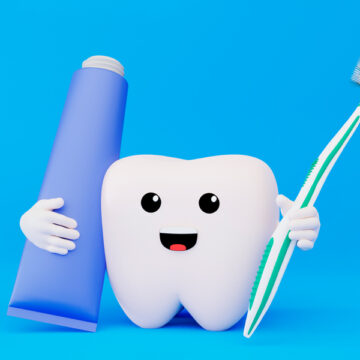According to the American Academy of Pediatric Dentistry, approximately 40 percent of all children have more than one cavity by the time they start kindergarten. Unfortunately, tooth decay is the most common preventable disease affecting children today.
Some parents dismiss the importance of caring for their child’s primary teeth because all of them eventually give way to permanent adult teeth. However, early tooth decay and premature loss of baby teeth affects the development of the permanent teeth. That is why starting an oral health care routine from an early age is essential.
It’s Never Too Early to Start Caring for Your Child’s Oral Hygiene
You can start promoting oral hygiene for kids before your baby even has teeth. At Bay Area Kids Dentist, we recommend that parents use a soft damp cloth to wipe off their baby’s gums every day. This removes bacteria and keeps the gums healthy before the first tooth even erupts. It isn’t necessary to use toothpaste until your baby actually does have teeth.
The average age for the first tooth to emerge is six to seven months old. We agree with the American Academy of Pediatric Dentistry that parents should schedule their child’s first dental check-up by the first birthday. If the first tooth erupts a bit later, it’s fine to wait until your child has had teeth for six months. By introducing dental hygiene for kids at this young age, your toddler will come to accept it as part of the daily routine.
Oral Care Instruction is Part of a Routine Appointment
Many parents have questions about how to brush their baby’s teeth properly, especially first-time parents. We are happy to teach you an oral care routine that you can do at home. Our dentists don’t recommend using toothpaste until your child is old enough to spit and rinse. In the meantime, brushing his or her teeth with a toddler-sized toothbrush and water is sufficient to remove bacteria and food particles. Most kids are ready to take a more active role in the process between two and three years of age. However, we advise you to continue supervising your child during tooth brushing until around age seven.
You know your child best and will be able to determine when he or she is ready for independent tooth brushing. Allowing your son or daughter the opportunity to watch you brush your own teeth is one way to go about teaching the process. Another option is to brush your child’s teeth yourself and then ask him or her to repeat what you just did. Brush one or two teeth at a time at a 45-degree angle to make sure you get the entire surface area clean.
Just as we do at Bay Area Kids Dentist, we recommend that you explain each step to your child before you do it. Be sure to praise him or her for making an effort, no matter how much of a mess it creates. We think you will find that a little encouragement goes a long way.
Problems We Treat
- Emergency Tooth Extraction
- Severe Toothache
- Loose or Dislodged Tooth
- Bleeding Gums
- Knocked Out Tooth
- Infection or Swelling in the Mouth
- Jaw Pain
- Chipped or Cracked Tooth
FAQs
Start brushing as soon as the very first tooth appears, usually around 6 months. Utilize a soft-bristled toothbrush and a tiny smear of fluoride toothpaste.
Help your child brush their teeth twice a day with fluoride toothpaste, limit sugary snacks and drinks, and visit the dentist periodically for cleanings and check-ups.
Watch for signs such as tooth pain, sensitivity to very hot or cold temperatures, visible holes, or dark spots. Regular dental visits help catch cavities early.
Untreated cavities may lead to pain, infection, and may affect how adult teeth come in. It’s important to treat them, even in baby teeth.
It could be a cavity, tooth injury, gum infection, or something stuck between the teeth. A dental checkup can find the cause.
Sudden pain may be caused by a cavity, a cracked tooth, an abscess, or even sinus pressure. It’s best to have a dentist examine it.
Most babies get their first tooth between 6 to 10 months, starting with the lower front teeth.
Bleeding gums can be caused due to brushing too hard, plaque buildup, or the early stages of gum disease. Ensure your child brushes their teeth gently and regularly.
Persistent bad breath can indicate poor brushing, cavities, gum issues, dry mouth, or even allergies. A dental checkup can help find the reason.
Thumb-sucking is normal in babies, but it can affect tooth alignment if it continues past age 4. Consult your dentist if you are concerned.
If it’s a baby tooth, don’t try to put it back—call us for advice. If it’s a permanent tooth, gently rinse it and try to place it back in the socket or in milk, and come to the dentist right away.
Nighttime grinding (bruxism) is common in kids and can be caused due to stress, misaligned teeth, or sleep issues. We can evaluate if treatment is needed.
Sugary snacks, sticky candies, soda, and even dried fruits can lead to cavities. Encourage water, fruits, and crunchy veggies instead.
Not always, but it can be an early sign of gum disease or poor oral hygiene. Regular brushing and checkups help keep gums healthy.
Many kids start orthodontic evaluation around age 7. Early checks help plan for braces if needed.
Yes, but only for kids over age 6 who can spit it out. Choose child-friendly mouthwashes with fluoride.



















